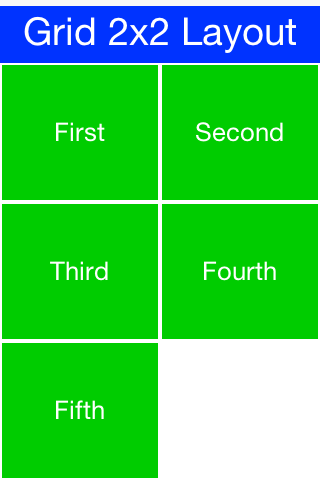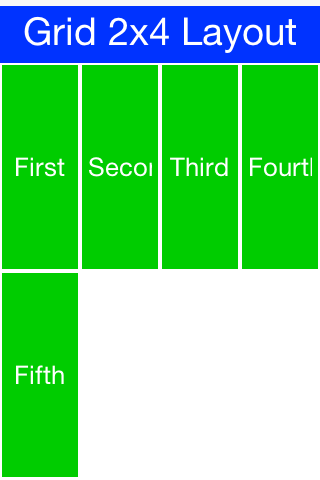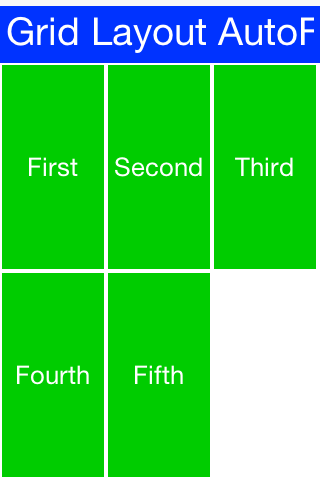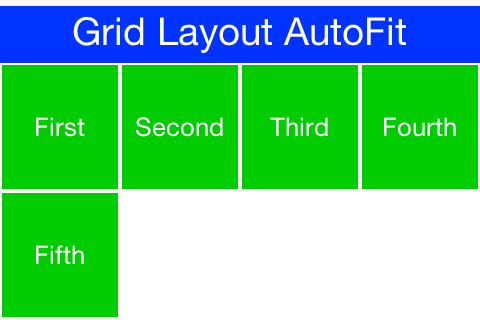
com.codename1.ui.layouts.GridLayout Maven / Gradle / Ivy
/*
* Copyright (c) 2008, 2010, Oracle and/or its affiliates. All rights reserved.
* DO NOT ALTER OR REMOVE COPYRIGHT NOTICES OR THIS FILE HEADER.
* This code is free software; you can redistribute it and/or modify it
* under the terms of the GNU General Public License version 2 only, as
* published by the Free Software Foundation. Oracle designates this
* particular file as subject to the "Classpath" exception as provided
* by Oracle in the LICENSE file that accompanied this code.
*
* This code is distributed in the hope that it will be useful, but WITHOUT
* ANY WARRANTY; without even the implied warranty of MERCHANTABILITY or
* FITNESS FOR A PARTICULAR PURPOSE. See the GNU General Public License
* version 2 for more details (a copy is included in the LICENSE file that
* accompanied this code).
*
* You should have received a copy of the GNU General Public License version
* 2 along with this work; if not, write to the Free Software Foundation,
* Inc., 51 Franklin St, Fifth Floor, Boston, MA 02110-1301 USA.
*
* Please contact Oracle, 500 Oracle Parkway, Redwood Shores
* CA 94065 USA or visit www.oracle.com if you need additional information or
* have any questions.
*/
package com.codename1.ui.layouts;
import com.codename1.ui.Component;
import com.codename1.ui.Container;
import com.codename1.ui.Display;
import com.codename1.ui.geom.Dimension;
import com.codename1.ui.plaf.Style;
/**
* The components are arranged in a grid based on available space, all cells in the grid are given exactly
* the same size which matches the largest preferred size or available space. The main use case for this layout
* is a grid of icons e.g. like one would see in the iPhone home screen.
* If the number of rows * columns is smaller than the number of components added a new row is implicitly added to the grid.
* However, if the number of components is smaller than available cells (won't fill the last row) blank spaces will
* be left in place.
*
*
* In this example we can see that a 2x2 grid is used to add 5 elements, this results in an additional row that's implicitly
* added turning the grid to a 3x2 grid implicitly and leaving one blank cell.
*
*
*  *
*
* When we use a 2x4 size ratio we would see elements getting cropped as we do here. The grid layout uses the grid
* size first and doesn't pay too much attention to the preferred size of the components it holds.
*
*  *
*
* Grid also has an autoFit attribute that can be used to automatically calculate the column count based on
* available space and preferred width. This is really useful for working with UI's where the device orientation
* might change.
* There is also a terse syntax for working with a grid that has two versions, one that uses the "auto fit" option and
* another that accepts the column names. Heres a sample of the terse syntax coupled with the auto fit screenshots
* of the same code in two orientations:
*
*
*  *
*  *
*
* @author Chen Fishbein
*/
public class GridLayout extends Layout{
private boolean fillLastRow;
private int portraitRows;
private int portraitColumns;
private int landscapeRows = -1;
private int landscapeColumns = -1;
/**
* When set to true components that have 0 size will be hidden and won't occupy a cell within the grid. This
* makes animating a grid layout component MUCH easier.
*/
private boolean hideZeroSized;
/**
* Auto fits columns/rows to available screen space
*/
private boolean autoFit;
/**
* Creates a new instance of GridLayout with the given rows and columns
*
* @param rows - number of rows.
* @param columns - number of columns.
* @throws IllegalArgumentException if rows < 1 or columns < 1
*/
public GridLayout(int rows, int columns) {
this.portraitRows = rows;
this.portraitColumns = columns;
if(rows < 1 || columns < 1){
throw new IllegalArgumentException("Rows and columns must be greater than zero");
}
}
/**
* Creates a new instance of GridLayout with the given rows and columns
*
* @param rows - number of rows.
* @param columns - number of columns.
* @param landscapeRows - number of rows when in landscape mode
* @param landscapeColumns - number of columns when in landscape mode
*
* @throws IllegalArgumentException if rows < 1 or columns < 1
*/
public GridLayout(int rows, int columns, int landscapeRows, int landscapeColumns) {
this.portraitRows = rows;
this.portraitColumns = columns;
this.landscapeRows = landscapeRows;
this.landscapeColumns = landscapeColumns;
if(rows < 1 || columns < 1){
throw new IllegalArgumentException("Rows and columns must be greater than zero");
}
}
/**
* Creates a new instance of GridLayout with the given columns, rows is set to 1 but will implicitly grow
* if more components are added
*
* @param columns - number of columns.
* @throws IllegalArgumentException if rows < 1 or columns < 1
*/
public GridLayout(int columns) {
this(1, columns);
}
/**
* Returns a grid layout that implicitly auto-fits to width in term of number of columns
* @return a grid layout that automatically adapts its size
*/
public static GridLayout autoFit() {
GridLayout g= new GridLayout(1);
g.setAutoFit(true);
return g;
}
/**
* Creates a new container with an auto fit grid layout and the components added to it
* @param cmp the components
* @return a new container
*/
public static Container encloseIn(Component... cmp) {
return Container.encloseIn(autoFit(), cmp);
}
/**
* Creates a new container with the grid layout and the components added to it
*
* @param columns the number of columns for the grid
* @param cmp the components
* @return a new container
*/
public static Container encloseIn(int columns, Component... cmp) {
return Container.encloseIn(new GridLayout(columns), cmp);
}
private boolean isLandscapeMode() {
return landscapeRows > -1 && (!Display.getInstance().isPortrait());
}
private void autoSizeCols(Container parent, int width, boolean landscapeMode) {
if(isAutoFit()) {
int numOfcomponents = parent.getComponentCount();
int maxWidth = 0;
for(int iter = 0 ; iter < numOfcomponents ; iter++) {
Component cmp = parent.getComponentAt(iter);
Style s = cmp.getStyle();
maxWidth = Math.max(cmp.getPreferredW() + s.getHorizontalMargins(), maxWidth);
}
if(width < maxWidth) {
width = Display.getInstance().getDisplayWidth();
}
if(landscapeMode) {
// prevent arithmentic exception
if(maxWidth <= 0) {
landscapeColumns = 1;
} else {
landscapeColumns = Math.max(width / maxWidth, 1);
}
landscapeRows = Math.max(1, numOfcomponents / landscapeColumns);
if(numOfcomponents % landscapeColumns > 0 && numOfcomponents > landscapeColumns) {
landscapeRows++;
}
} else {
// prevent arithmentic exception
if(maxWidth <= 0) {
portraitColumns = 1;
} else {
portraitColumns = Math.max(width / maxWidth, 1);
}
portraitRows = Math.max(1, numOfcomponents / portraitColumns);
if(numOfcomponents % portraitColumns > 0 && numOfcomponents > portraitColumns) {
portraitRows++;
}
}
}
}
/**
* {@inheritDoc}
*/
public void layoutContainer(Container parent) {
Style s = parent.getStyle();
int width = parent.getLayoutWidth() - parent.getSideGap() - s.getHorizontalPadding();
int height = parent.getLayoutHeight() - parent.getBottomGap() - s.getVerticalPadding();
int numOfcomponents = parent.getComponentCount();
boolean landscapeMode = isLandscapeMode();
autoSizeCols(parent, width, landscapeMode);
int rows, columns;
if(landscapeMode) {
rows = landscapeRows;
columns = landscapeColumns;
} else {
rows = portraitRows;
columns = portraitColumns;
}
int x = s.getPaddingLeft(parent.isRTL());
int y = s.getPaddingTop();
boolean rtl = parent.isRTL();
if (rtl) {
x += parent.getSideGap();
}
int localColumns = columns;
int cmpWidth = width / columns;
int cmpHeight;
if (numOfcomponents > rows * columns) {
// actual rows number
cmpHeight = height / (numOfcomponents / columns + (numOfcomponents % columns == 0 ? 0 : 1));
} else {
cmpHeight = height / rows;
}
int row = 0;
int offset = 0;
for(int iter = 0 ; iter < numOfcomponents ; iter++){
Component cmp = parent.getComponentAt(iter);
Style cmpStyle = cmp.getStyle();
int marginLeft = cmpStyle.getMarginLeft(parent.isRTL());
int marginTop = cmpStyle.getMarginTop();
if(hideZeroSized) {
if(cmp.isHidden()) {
continue;
}
}
cmp.setWidth(cmpWidth - marginLeft - cmpStyle.getMarginRight(parent.isRTL()));
cmp.setHeight(cmpHeight - marginTop - cmpStyle.getMarginBottom());
if (rtl) {
cmp.setX(x + (localColumns - 1 - (offset % localColumns)) * cmpWidth + marginLeft);
} else {
cmp.setX(x + (offset % localColumns) * cmpWidth + marginLeft);
}
cmp.setY(y + row * cmpHeight + marginTop);
if((offset + 1) % columns == 0){
row++;
// check if we need to recalculate component widths
if(fillLastRow && row == rows - 1) {
localColumns = numOfcomponents % columns;
if(localColumns == 0) {
localColumns = columns;
}
cmpWidth = width / localColumns;
}
}
offset++;
}
}
/**
* {@inheritDoc}
*/
public Dimension getPreferredSize(Container parent) {
int width = 0;
int height = 0;
int numOfcomponents = parent.getComponentCount();
for(int i=0; i< numOfcomponents; i++){
Component cmp = parent.getComponentAt(i);
width = Math.max(width, cmp.getPreferredW() + cmp.getStyle().getMarginLeftNoRTL()+ cmp.getStyle().getMarginRightNoRTL());
height = Math.max(height, cmp.getPreferredH()+ cmp.getStyle().getMarginTop()+ cmp.getStyle().getMarginBottom());
}
boolean landscapeMode = isLandscapeMode();
autoSizeCols(parent, parent.getWidth(), landscapeMode);
int rows, columns;
if(landscapeMode) {
rows = landscapeRows;
columns = landscapeColumns;
} else {
rows = portraitRows;
columns = portraitColumns;
}
if(columns > 1){
width = width*columns;
}
if(rows > 1){
if(numOfcomponents>rows*columns){ //if there are more components than planned
height = height * (numOfcomponents/columns + (numOfcomponents%columns == 0 ? 0 : 1));
}else{
height = height*rows;
}
}
Style s = parent.getStyle();
return new Dimension(width + s.getHorizontalPadding(),
height + s.getVerticalPadding());
}
/**
* {@inheritDoc}
*/
public String toString() {
return "GridLayout";
}
/**
* @return the rows
*/
public int getRows() {
return portraitRows;
}
/**
* @return the columns
*/
public int getColumns() {
return portraitColumns;
}
/**
* {@inheritDoc}
*/
public boolean equals(Object o) {
return super.equals(o) && ((GridLayout)o).getRows() == getRows() &&
((GridLayout)o).getColumns() == getColumns() && ((GridLayout)o).autoFit == autoFit;
}
/**
* When set to true makes the grid layout fill the last row of the layout
* entirely if the number of elements in that row is bigger.
*
* @return the fillLastRow
*/
public boolean isFillLastRow() {
return fillLastRow;
}
/**
* When set to true makes the grid layout fill the last row of the layout
* entirely if the number of elements in that row is bigger.
*
* @param fillLastRow the fillLastRow to set
*/
public void setFillLastRow(boolean fillLastRow) {
this.fillLastRow = fillLastRow;
}
/**
* Auto fits columns/rows to available screen space
* @return the autoFit
*/
public boolean isAutoFit() {
return autoFit;
}
/**
* Auto fits columns/rows to available screen space
* @param autoFit the autoFit to set
*/
public void setAutoFit(boolean autoFit) {
this.autoFit = autoFit;
}
/**
* {@inheritDoc}
*/
public boolean obscuresPotential(Container parent) {
return parent.getComponentCount() == portraitRows * portraitColumns || autoFit;
}
/**
* When set to true components that have 0 size will be hidden and won't occupy a cell within the grid. This
* makes animating a grid layout component MUCH easier.
* @return the hideZeroSized
*/
public boolean isHideZeroSized() {
return hideZeroSized;
}
/**
* When set to true components that have 0 size will be hidden and won't occupy a cell within the grid. This
* makes animating a grid layout component MUCH easier.
* @param hideZeroSized the hideZeroSized to set
*/
public void setHideZeroSized(boolean hideZeroSized) {
this.hideZeroSized = hideZeroSized;
}
}
*
*
* @author Chen Fishbein
*/
public class GridLayout extends Layout{
private boolean fillLastRow;
private int portraitRows;
private int portraitColumns;
private int landscapeRows = -1;
private int landscapeColumns = -1;
/**
* When set to true components that have 0 size will be hidden and won't occupy a cell within the grid. This
* makes animating a grid layout component MUCH easier.
*/
private boolean hideZeroSized;
/**
* Auto fits columns/rows to available screen space
*/
private boolean autoFit;
/**
* Creates a new instance of GridLayout with the given rows and columns
*
* @param rows - number of rows.
* @param columns - number of columns.
* @throws IllegalArgumentException if rows < 1 or columns < 1
*/
public GridLayout(int rows, int columns) {
this.portraitRows = rows;
this.portraitColumns = columns;
if(rows < 1 || columns < 1){
throw new IllegalArgumentException("Rows and columns must be greater than zero");
}
}
/**
* Creates a new instance of GridLayout with the given rows and columns
*
* @param rows - number of rows.
* @param columns - number of columns.
* @param landscapeRows - number of rows when in landscape mode
* @param landscapeColumns - number of columns when in landscape mode
*
* @throws IllegalArgumentException if rows < 1 or columns < 1
*/
public GridLayout(int rows, int columns, int landscapeRows, int landscapeColumns) {
this.portraitRows = rows;
this.portraitColumns = columns;
this.landscapeRows = landscapeRows;
this.landscapeColumns = landscapeColumns;
if(rows < 1 || columns < 1){
throw new IllegalArgumentException("Rows and columns must be greater than zero");
}
}
/**
* Creates a new instance of GridLayout with the given columns, rows is set to 1 but will implicitly grow
* if more components are added
*
* @param columns - number of columns.
* @throws IllegalArgumentException if rows < 1 or columns < 1
*/
public GridLayout(int columns) {
this(1, columns);
}
/**
* Returns a grid layout that implicitly auto-fits to width in term of number of columns
* @return a grid layout that automatically adapts its size
*/
public static GridLayout autoFit() {
GridLayout g= new GridLayout(1);
g.setAutoFit(true);
return g;
}
/**
* Creates a new container with an auto fit grid layout and the components added to it
* @param cmp the components
* @return a new container
*/
public static Container encloseIn(Component... cmp) {
return Container.encloseIn(autoFit(), cmp);
}
/**
* Creates a new container with the grid layout and the components added to it
*
* @param columns the number of columns for the grid
* @param cmp the components
* @return a new container
*/
public static Container encloseIn(int columns, Component... cmp) {
return Container.encloseIn(new GridLayout(columns), cmp);
}
private boolean isLandscapeMode() {
return landscapeRows > -1 && (!Display.getInstance().isPortrait());
}
private void autoSizeCols(Container parent, int width, boolean landscapeMode) {
if(isAutoFit()) {
int numOfcomponents = parent.getComponentCount();
int maxWidth = 0;
for(int iter = 0 ; iter < numOfcomponents ; iter++) {
Component cmp = parent.getComponentAt(iter);
Style s = cmp.getStyle();
maxWidth = Math.max(cmp.getPreferredW() + s.getHorizontalMargins(), maxWidth);
}
if(width < maxWidth) {
width = Display.getInstance().getDisplayWidth();
}
if(landscapeMode) {
// prevent arithmentic exception
if(maxWidth <= 0) {
landscapeColumns = 1;
} else {
landscapeColumns = Math.max(width / maxWidth, 1);
}
landscapeRows = Math.max(1, numOfcomponents / landscapeColumns);
if(numOfcomponents % landscapeColumns > 0 && numOfcomponents > landscapeColumns) {
landscapeRows++;
}
} else {
// prevent arithmentic exception
if(maxWidth <= 0) {
portraitColumns = 1;
} else {
portraitColumns = Math.max(width / maxWidth, 1);
}
portraitRows = Math.max(1, numOfcomponents / portraitColumns);
if(numOfcomponents % portraitColumns > 0 && numOfcomponents > portraitColumns) {
portraitRows++;
}
}
}
}
/**
* {@inheritDoc}
*/
public void layoutContainer(Container parent) {
Style s = parent.getStyle();
int width = parent.getLayoutWidth() - parent.getSideGap() - s.getHorizontalPadding();
int height = parent.getLayoutHeight() - parent.getBottomGap() - s.getVerticalPadding();
int numOfcomponents = parent.getComponentCount();
boolean landscapeMode = isLandscapeMode();
autoSizeCols(parent, width, landscapeMode);
int rows, columns;
if(landscapeMode) {
rows = landscapeRows;
columns = landscapeColumns;
} else {
rows = portraitRows;
columns = portraitColumns;
}
int x = s.getPaddingLeft(parent.isRTL());
int y = s.getPaddingTop();
boolean rtl = parent.isRTL();
if (rtl) {
x += parent.getSideGap();
}
int localColumns = columns;
int cmpWidth = width / columns;
int cmpHeight;
if (numOfcomponents > rows * columns) {
// actual rows number
cmpHeight = height / (numOfcomponents / columns + (numOfcomponents % columns == 0 ? 0 : 1));
} else {
cmpHeight = height / rows;
}
int row = 0;
int offset = 0;
for(int iter = 0 ; iter < numOfcomponents ; iter++){
Component cmp = parent.getComponentAt(iter);
Style cmpStyle = cmp.getStyle();
int marginLeft = cmpStyle.getMarginLeft(parent.isRTL());
int marginTop = cmpStyle.getMarginTop();
if(hideZeroSized) {
if(cmp.isHidden()) {
continue;
}
}
cmp.setWidth(cmpWidth - marginLeft - cmpStyle.getMarginRight(parent.isRTL()));
cmp.setHeight(cmpHeight - marginTop - cmpStyle.getMarginBottom());
if (rtl) {
cmp.setX(x + (localColumns - 1 - (offset % localColumns)) * cmpWidth + marginLeft);
} else {
cmp.setX(x + (offset % localColumns) * cmpWidth + marginLeft);
}
cmp.setY(y + row * cmpHeight + marginTop);
if((offset + 1) % columns == 0){
row++;
// check if we need to recalculate component widths
if(fillLastRow && row == rows - 1) {
localColumns = numOfcomponents % columns;
if(localColumns == 0) {
localColumns = columns;
}
cmpWidth = width / localColumns;
}
}
offset++;
}
}
/**
* {@inheritDoc}
*/
public Dimension getPreferredSize(Container parent) {
int width = 0;
int height = 0;
int numOfcomponents = parent.getComponentCount();
for(int i=0; i< numOfcomponents; i++){
Component cmp = parent.getComponentAt(i);
width = Math.max(width, cmp.getPreferredW() + cmp.getStyle().getMarginLeftNoRTL()+ cmp.getStyle().getMarginRightNoRTL());
height = Math.max(height, cmp.getPreferredH()+ cmp.getStyle().getMarginTop()+ cmp.getStyle().getMarginBottom());
}
boolean landscapeMode = isLandscapeMode();
autoSizeCols(parent, parent.getWidth(), landscapeMode);
int rows, columns;
if(landscapeMode) {
rows = landscapeRows;
columns = landscapeColumns;
} else {
rows = portraitRows;
columns = portraitColumns;
}
if(columns > 1){
width = width*columns;
}
if(rows > 1){
if(numOfcomponents>rows*columns){ //if there are more components than planned
height = height * (numOfcomponents/columns + (numOfcomponents%columns == 0 ? 0 : 1));
}else{
height = height*rows;
}
}
Style s = parent.getStyle();
return new Dimension(width + s.getHorizontalPadding(),
height + s.getVerticalPadding());
}
/**
* {@inheritDoc}
*/
public String toString() {
return "GridLayout";
}
/**
* @return the rows
*/
public int getRows() {
return portraitRows;
}
/**
* @return the columns
*/
public int getColumns() {
return portraitColumns;
}
/**
* {@inheritDoc}
*/
public boolean equals(Object o) {
return super.equals(o) && ((GridLayout)o).getRows() == getRows() &&
((GridLayout)o).getColumns() == getColumns() && ((GridLayout)o).autoFit == autoFit;
}
/**
* When set to true makes the grid layout fill the last row of the layout
* entirely if the number of elements in that row is bigger.
*
* @return the fillLastRow
*/
public boolean isFillLastRow() {
return fillLastRow;
}
/**
* When set to true makes the grid layout fill the last row of the layout
* entirely if the number of elements in that row is bigger.
*
* @param fillLastRow the fillLastRow to set
*/
public void setFillLastRow(boolean fillLastRow) {
this.fillLastRow = fillLastRow;
}
/**
* Auto fits columns/rows to available screen space
* @return the autoFit
*/
public boolean isAutoFit() {
return autoFit;
}
/**
* Auto fits columns/rows to available screen space
* @param autoFit the autoFit to set
*/
public void setAutoFit(boolean autoFit) {
this.autoFit = autoFit;
}
/**
* {@inheritDoc}
*/
public boolean obscuresPotential(Container parent) {
return parent.getComponentCount() == portraitRows * portraitColumns || autoFit;
}
/**
* When set to true components that have 0 size will be hidden and won't occupy a cell within the grid. This
* makes animating a grid layout component MUCH easier.
* @return the hideZeroSized
*/
public boolean isHideZeroSized() {
return hideZeroSized;
}
/**
* When set to true components that have 0 size will be hidden and won't occupy a cell within the grid. This
* makes animating a grid layout component MUCH easier.
* @param hideZeroSized the hideZeroSized to set
*/
public void setHideZeroSized(boolean hideZeroSized) {
this.hideZeroSized = hideZeroSized;
}
}